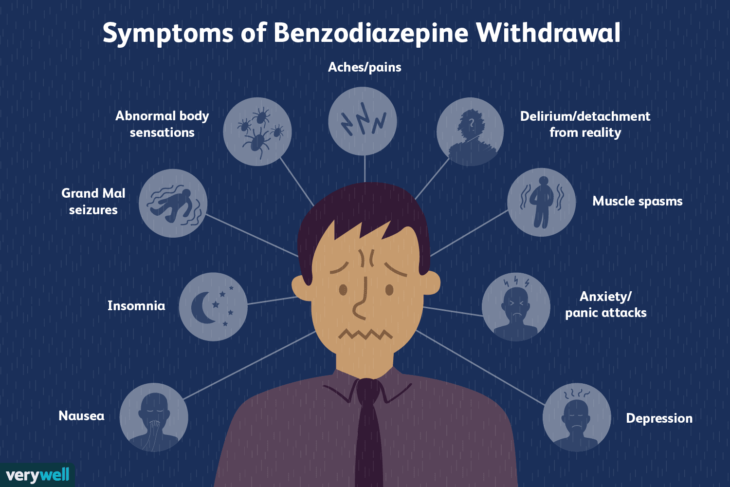The treatment and management of addictions dependence is a process that requires as much care as possible. Relapse, rough treatment, and reliance on medications that help with the withdrawal process can pose grave dangers. There are various methods of withdrawal from these forms of addictions. However, withdrawal is never easy as the intention comes from the heart. The withdrawal from certain illegal substances comes with severe reactions, including insomnia, seizures, itching, and so on.
Currently the most prescribed medications in the country today, Benzodiazepines are a class of depressants which act on the central nervous system and are used in the clinical treatment of seizures, anxiety, insomnia, and other related symptoms. They are used in the management of addictions and, when used inaccurate dosages, are quite harmless, but the wrong doses can lead to a case of physical dependence. Hence, it is important that anyone who wants to opt for benzodiazepine treatment should do so under supervision or the instruction of a professional.
There are different stages of withdrawing from addictions, and each one has to be effectively managed. Therefore, it is needful for a certified or qualified entity to guide through the benzodiazepine withdrawal process. For one who intends to embark on benzodiazepine withdrawal, it is vital to know what the treatment process entails, most importantly, how you would feel during the process. Having a mental preparation for the withdrawal process will certainly help. According to recoverycnt.com, there are certain essential things concerning the treatment of Benzodiazepine withdrawal to be aware of:

Source: Verywell Mind
Contents
1. Withdrawal symptoms
The treatment comes with unavoidable symptoms. The common of benzodiazepine withdrawal symptoms include nausea, aches and pains, anxiety and panic attack, insomnia, delirium, grand mal seizures, depression, abnormal nervous sensations, muscle spasms, weight loss, sweating, loss of appetite, tremors, headaches, etc. Symptoms of other underlying issues may rebound. Because they have euphoric effects, users run the risk of becoming dependent on them, and when withdrawal begins, the endocrine and nervous systems tend to be affected.
Withdrawal symptoms can occur even on little doses from as early as a month of use. The symptoms can be mild, moderate, or severe in manifestation; it varies from person to person. The severity depends on some other factors like interaction with other illegal substances, a history of substance abuse, dosage, and length of usage.
2. Professional vs. DIY care
While it is possible to withdraw from Benzos on your own, the success rate is statistically low. That is why it is crucial to seek professional help. According to recoverycnt.com, getting professional help positions the patient for a smoother experience in withdrawing. Also, as mentioned, there are various stages of the withdrawal process; a professional has the medical knowledge and experience to guide the patient through each of the stages.
3. Total health is vital
The withdrawal process is quite tasking on the entire body, and there is a need to watch your health. In many cases, relapse is triggered by one or more issues relating to health, and this can be avoided. Eat right, exercise, and always stay hydrated during and after the recovery process. If you need to join a support group, then do so. It also helps to have time with people dear to you, as emotional support plays an essential role in the recovery process.

Source: Promises Behavioral Health
4. The process is slow
Withdrawal isn’t always a picnic, and for best results, research suggests that the weaning process be made slowly. Doses will be reduced gradually to avoid inducing sudden health issues.
5. Possible causes of reemergence and rebounding
It is possible to have those symptoms for which the patient first indulged in benzodiazepine recur during the treatment process. It is normal; so, there is no need to fret. Reemergence occurs when those initial symptoms come back. However, rebound happens when the symptoms come back with a worse force. With your therapist or physician walking every part of the journey with you, you will definitely emerge above the symptoms.
6. It Requires a mental effort
Getting through the process is not an easy one, but it is the right thing to do. The earlier the treatment process for benzodiazepine withdrawal is indulged, the better it is for an individual. The symptoms may be discouraging, especially in the first few weeks of withdrawal. However, the patient can pull through this by consciously remembering that “It is the right thing to do. The earlier, the better.”

Source: Vaaju
7. Ask your doctor always
Most of the symptoms can be treated or managed using other medications like painkillers, but it is still essential to consult a doctor or other qualified health professionals. As stated above, drug-drug interactions can hinder or jeopardize the entire recovery process, so if you cannot bear any particular symptoms like aches, pains, or loss of appetite, ask your doctor before taking medications or supplements.
8. Be careful of antidepressants
When coming off benzodiazepines, many people get moody and depressed. To help this feeling, the therapist may suggest antidepressants to help. For anyone who is contemplating this, it is important to be aware of the benefits or potential ills of taking these antidepressants. It also requires a strong will not to keep popping the antidepressant pills to subdue the feeling. Hence, it is suggested that all things are thoroughly discussed before embarking on the journey or at different stages of the withdrawal.
9. Withdrawal is possible
When the symptoms and durations are considered, the mind can be weary, thinking this might be impossible. It is possible. It is possible to have a benzodiazepine withdrawal successfully. That is why a treatment routine is suggested. The chances of a successful withdrawal get heightened when a professional is involved.
Conclusively, the process can be severe and prolonged, but if the right help is gotten, a happy ending is guaranteed. And through the benzodiazepine withdrawal treatment, it is helpful to always keep in mind that “it is the right thing to do.”
